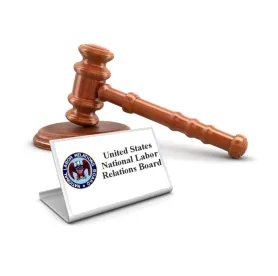In yet another end-of-2019 decision overruling significant NLRA precedent, the Board reverted to the less stringent Spielberg / Olin standard for determining whether to defer to arbitration decisions in the context of Section 8(a)(1) and (3) unfair labor practice cases. See United Parcel Service, Inc., 369 NLRB 1 (2019). The Board issued this decision unanimously, in the first significant decision with only three Republican members after Member McFerran‘s term ended on December 16th.
Factual Background
A package driver was discharged for allegedly violating the employer’s delivery procedures. The driver filed two grievances under the parties’ collective bargaining agreement, which also alleged that he was discharged in violation of 8(a)(3) of the Act. The grievance panel denied the grievances.
The driver filed unfair labor practice charges over the same issues as addressed in the grievances. After trial, an Administrative Law Judge found the discharge violated the Act. The ALJ applied the 2014 Babcock standard for evaluating the case in light of the grievances.
The NLRB reversed and in so doing, overruled Babcock and reinstated the Spielberg / Olin standard, restoring the standard that had been in place prior to 2014.
Babcock Standard
In 2014, the Board, in Babcock & Wilcox Construction Co., 361 NLRB 1127 (2014), stated it would not defer to arbitral decisions unless “(1) the arbitrator was explicitly authorized to decide the unfair labor practice issue; (2) the arbitrator was presented with and considered the statutory issue, or was prevented from doing so by the party opposing deferral; and (3) Board law reasonably permits the award.” The burden of proof under this standard rested with the party urging deferral.
Babcock also established a standard for pre-arbitral deferral to grievance arbitration proceedings and to pre-arbitral grievance settlements in unfair labor practice cases alleging discharge or discipline in violation of NLRA § 8(a)(1) and (3): the Board would not defer to grievance arbitration proceedings in these cases unless the parties in a collective-bargaining relationship have “explicitly authorized an arbitrator to decide the unfair labor practice issue, and that it would not defer to grievance settlement agreements that did not comport with the new requirements for postarbitral deferral.”
Almost no grievance procedure provides such explicit authorization, so the Babcock standard resulted in employers having to defend the employment action twice, under the grievance procedure and in unfair labor practice proceedings.
Overruling Babcock
In its unanimous decision, the Board explained that deferral to collectively-bargained grievance-arbitration procedures is meant to balance the Board’s exclusive Section 10(a) authority to prevent unfair labor practices with the NLRA’s purpose to “reduce industrial strife by ‘encouraging practices fundamental to the friendly adjustment of industrial disputes’ and ‘encouraging the practice and procedure of collective bargaining.’” The Board noted it prefers – when feasible – to let “parties resolve employment disputes through negotiated mechanisms of their own choosing without resort to the Board’s processes.”
Spielberg/Olin Standard Reinstated
The Board‘s order has two significant components on arbitration deferral. First, the Board reinstated pre-arbitral deferral standards that existed prior to Babcock, and second, the Board reverted to the Spielberg/Olin standard for deferring to post-arbitral decisions in unfair labor practice cases alleging discharge or discipline in violation of NLRA Sections 8(a)(1) and (3).
Now, the Board will defer to an arbitration decision and award if: “(1) the arbitration proceedings were fair and regular, (2) the parties agreed to be bound, (3) the contractual issue was factually parallel to the unfair labor practice issue, (4) the arbitrator was presented generally with the facts relevant to resolving the unfair labor practice, and (5) the decision was not clearly repugnant to the purposes and policies of the Act.” The burden is once again on the party arguing against deferral.
The key difference is that the arbitrator need not expressly consider the unfair labor practice, as long as the contractual issue and ULP are factually parallel. Applying the post-arbitral deferral standard to the facts of this case, the Board reversed the ALJ and dismissed the case. The Board also noted that it would apply this standard retroactively to all other pending cases, at whatever stage.
Implications
This decision makes it far more likely that the Board will defer to the parties’ grievance arbitration process when faced with parallel unfair labor practice claims. This outcome aligns with long-standing Supreme Court precedent trumpeting arbitration, and encourages the collective bargaining parties to resort to negotiated dispute resolution machinery to resolve their disputes that potentially overlap with unfair labor practices. It also preserves the parties’ and the Board’s resources by potentially avoiding multiple litigations over the same facts and circumstances.
As noted above, this is the first significant decision after Member McFerran – the lone Democratic member of the Board — left the NLRB at the end of her term on December 16, 2019. Neither McFerran nor the other prior Democratic member, former Chairman Mark Gaston Pearce, has been replaced by President Trump, and the Board is now comprised of 3 Republican members. Traditionally, under such circumstances without a minority voice on the Board, the NLRB has declined to overturn precedent. But the UPS decision appears to depart from this precedent and signals that the Board may continue to stay busy into 2020 by overturning precedent.





 />i
/>i

